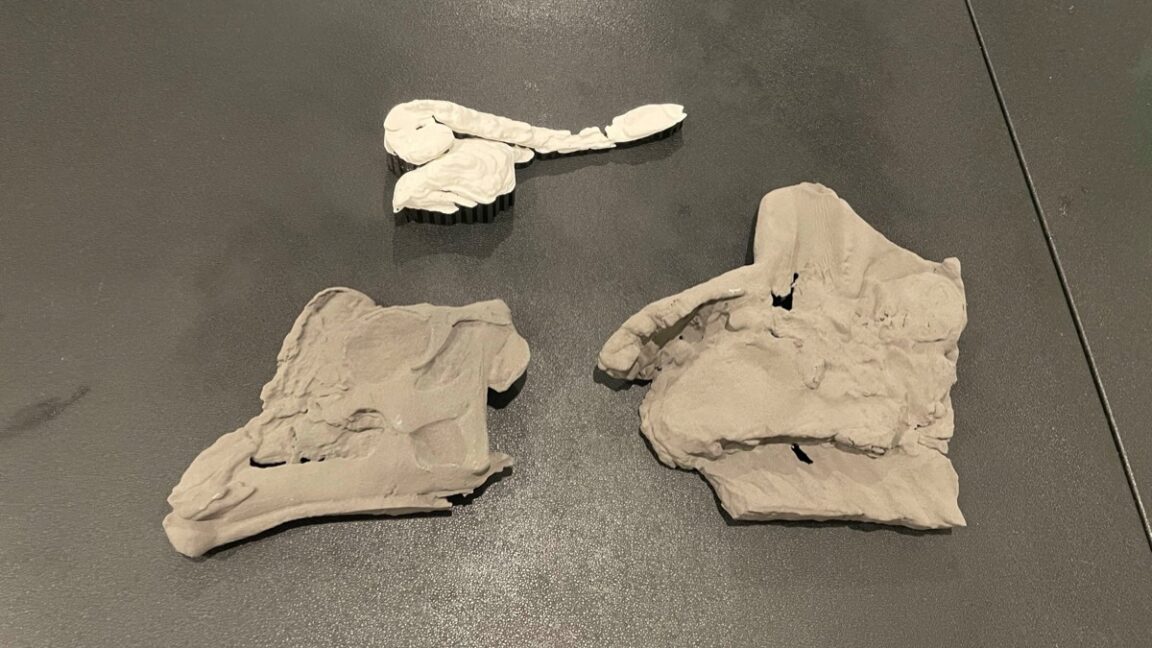Why 1994’s Lair of Squid was the weirdest pack-in game of all time

Aurich Lawson / HP
In 1994, Hewlett-Packard released a miracle machine: the HP 200LX pocket-size PC. In the depths of the device, among the MS-DOS productivity apps built into its fixed memory, there lurked a first-person maze game called Lair of Squid. Intrigued by the game, we tracked down its author, Andy Gryc, and probed into the title’s mysterious undersea origins.
“If you ask my family, they’ll confirm that I’ve been obsessed with squid for a long time,” Gryc told Ars Technica in an exclusive interview. “It’s admittedly very goofy—and that’s my fault—although I was inspired by Doom, which had come out relatively recently.”
In Lair of Squid, you’re trapped in an underwater labyrinth, seeking a way out while avoiding squid roaming the corridors. A collision with any cephalopod results in death. To progress through each stage and ascend to the surface, you locate the exit and provide a hidden, scrambled code word. The password is initially displayed as asterisks, with letters revealed as you encounter them within the maze.

Benj Edwards
Buckle up for a tale of rogue coding, cephalopod obsession, and the most unexpected Easter egg in palmtop history. This is no fish story—it’s the saga of Lair of Squid.
A computer in the palm of your hand
Introduced in 1994, the HP 200LX palmtop PC put desktop functionality in a pocket-size package. With a small QWERTY keyboard, MS-DOS compatibility, and a suite of productivity apps, the clamshell 200LX offered a vision of one potential future of mobile computing. It featured a 7.91 MHz 80186 CPU, a monochrome 640×200 CGA display, and 1–4 megabytes of RAM.

Hewlett Packard
I’ve collected vintage computers since 1993, and people frequently offer to send me old devices they’d rather not throw away. Recently, a former HP engineer sent me his small but nice collection of ’90s HP handheld palmtop computers, including a 95LX (1991), 100LX (1993), and 200LX.
HP designed its portable LX series to run many MS-DOS programs that feature text mode or CGA graphics, and each includes built-in versions of the Lotus 1-2-3 spreadsheet, a word processor, terminal program, calculator, and more.
I owned a 95LX as a kid (a hand-me-down from my dad’s friend), which came with a simplistic overhead maze game called TigerFox. So imagine my surprise in 2024, when trawling through the productivity and personal organization apps on that 200LX, to find a richly detailed first-person maze game based around cephalopods, of all things.
(I was less surprised to find an excellent built-in Minesweeper clone, Hearts and Bones, which is definitely a more natural fit for the power and form of the 200LX itself.)
Lair of Squid isn’t a true Doom clone since it’s not a first-person shooter (in some ways, it’s more like a first-person Pac-Man without pellets), but its mere existence—on a black-and-white device best suited for storing phone numbers and text notes—deserves note as one of the weirdest and most interesting pack-in games to ever exist.
Just after discovering Lair of Squid on my device earlier this year, I tweeted about it, and I extracted the file for the game (called “maze.exe”) from the internal ROM drive and sent it to DOS gaming historian Anatoly Shashkin, who put the game on The Internet Archive so anyone can play it in their browser.
After that, I realized that I wanted to figure out who wrote this quirky game, and thanks to a post on RGB Classic Games, I found a name: Andy Gryc. With some luck in cold-emailing, I found him.
Source link





